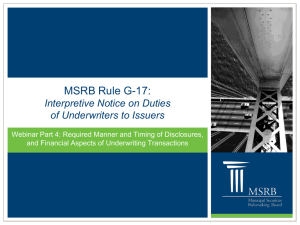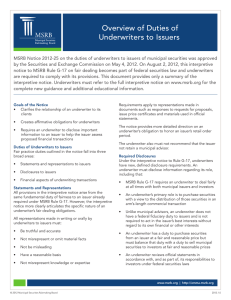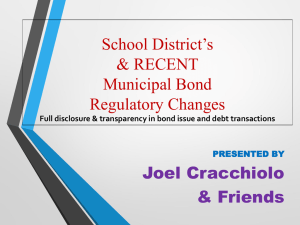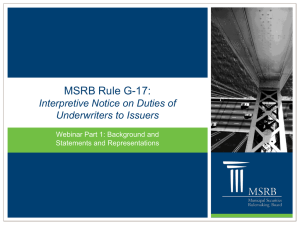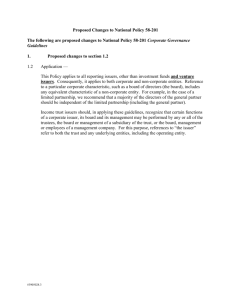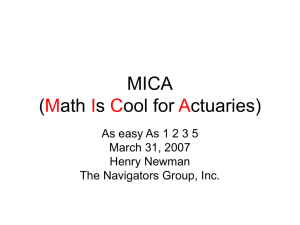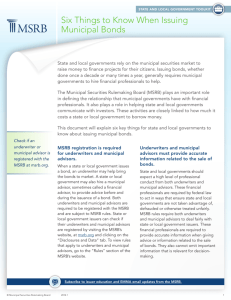Document 10445204
advertisement
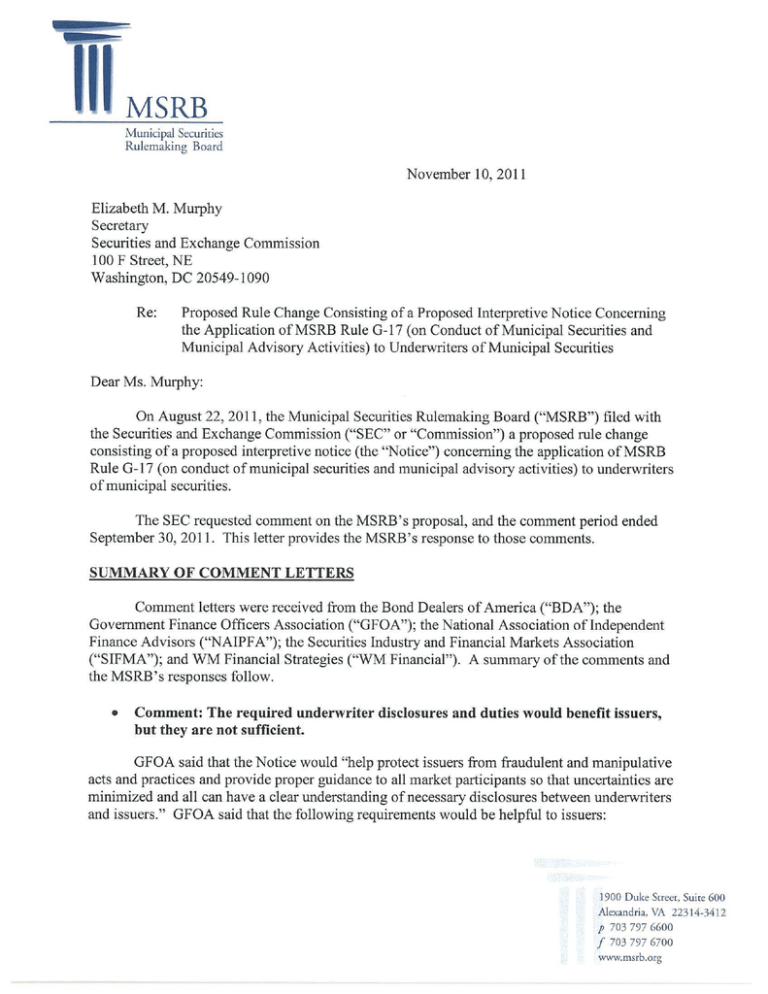
MSRB Municipal Securities Rul emaki ng Board November 10, 20 II Elizabeth M. Murphy Secretary Securities and Exchange Commission 100 F Street, NE Washington, DC 20549-1090 Re: Proposed Rule Change Consisting of a Proposed Interpretive Notice Concerning the Application of MSRB Rule G-17 (on Conduct of Municipal Securities and Municipal Advisory Activities) to Underwriters of Municipal Securities Dear Ms. Murphy: On August 22, 2011, the Municipal Securities Rulemaking Board ("MSRB") filed with the Securities and Exchange Commission ("SEC" or "Commission") a proposed rule change consisting of a proposed interpretive notice (the "Notice") concerning the application ofMSRB Rule G-17 (on conduct of municipal securities and municipal advisory activities) to underwriters of municipal securities. The SEC requested comment on the MSRB ' s proposal, and the comment period ended September 30, 2011. This letter provides the MSRB 's response to those comments. SUMMARY OF COMMENT LETTERS Comment letters were received from the Bond Dealers of America ("BDA"); the Government Finance Officers Association ("GFOA"); the National Association ofIndependent Finance Advisors ("NAIPF A"); the Securities Industry and Financial Markets Association ("SIFMA"); and WM Financial Strategies ("WM Financial"). A summary of the comments and the MSRB's responses follow. • Comment: The required underwriter disclosures and duties would benefit issuers, but they are not sufficient. GFOA said that the Notice would "help protect issuers from fraudulent and manipulative acts and practices and provide proper guidance to all market participants so that uncertainties are minimized and all can have a clear understanding of necessary disclosures between underwriters and issuers." GFOA said that the following requirements would be helpful to issuers: 1900 Duke Street. Suire 600 Alexandria, VA 223 14-3412 P 703 797 6600 f 703 797 6700 wW\v.msrb.org Elizabeth M. Murphy November 10, 2011 Page 2 o an underwriter's representations to issuers must be accurate and not misleading; o an underwriter's level of disclosure must be tailored according to the knowledge and sophistication of the issuer; o an underwriter must disclose to the issuer any incentives, conflicts of interest, or third-party payments; o an underwriter must pay the issuer a fair and reasonable price for its securities; o an underwriter must not manipulate retail order periods; o an underwriter must disclose credit default swap activities concerning the issuer or its securities; and o disclosures must be made within an adequate time frame, prior to the time of the execution of the bond purchase agreement. I However, GFOA said that the Notice should impose the following additional requirements on underwriters: o disclosure of pending litigation affecting the underwriter's municipal securities business; o disclosure if any experts of the firm that the issuer may have relied upon in selecting the particular underwriter for the transaction have departed from the firm; o disclosure of additional information about the risks associated with the transaction, including a comparison of different types of financings that may be applicable for the issuer's particular situation; o a statement by the underwriter that the issuer does not have a fiduciary responsibility to the issuer and that the issuer may choose to engage the services of an independent financial advisor to represent the issuer's interests in the transaction; GFOA recommended that, in the case of conflicts disclosures, the disclosures should be made when the underwriter is hired, and, in the case of disclosures concerning a financing, the disclosures should be made on an ongoing basis as the transaction is structured. Elizabeth M. Murphy November 10, 20 II Page 3 o a prohibition on an underwriter suggesting that the underwriter can serve, formally or informally, as the issuer's financial advisor as well as underwriter; and o disclosure of additional conflicts of interest "to ensure full protection of the issuer from unsettling business practices and relationships," including disclosures about contingent fees and the underwriter's duty to investors. GFOA also recommended that the MSRB: o develop and promote educational information for issuers about underwriting pricing and fees and the information that underwriters must disclose and appropriate questions issuers should ask their underwriters; o consider the application of suitability standards to the transaction an underwriter is proposing to an issuer; and o look at why, in the absence of significant changes in the market, a bond may trade up in price very soon after the initial pricing (~, within 2-5 days) and provide an operational definition of "flipping" and an explanation of why it is not an appropriate practice. MSRB Response. The MSRB appreciates the comments from GFOA and has incorporated many ofGFOA's recommendations in the amended Notice. In particular, the amended Notice would require underwriters to provide issuers with more robust disclosures, including disclosures that, unlike municipal advisors, underwriters do not have a fiduciary duty to issuers under the federal securities laws. It would also require more conflicts of interest disclosures by underwriters. It would also prohibit an underwriter from recommending that the issuer not retain a municipal advisor. The Notice already requires that underwriters disclose the risks associated with complex municipal securities financings, although it does not require that they disclose different types offinancings that might be applicable to an issuer's particular situation, as the MSRB considers that to be the duty of a municipal advisor, rather than an underwriter. Additional disclosures ~, pending litigation and whether certain personnel had left the firm) that do not rise to the level of conflicts could, of course, be required by issuers as they deem appropriate. Regarding the other recommendations made by GFOA not related to the Notice, the MSRB is in the process of developing materials designed to educate issuers as to the duties owed them by their underwriters under MSRB rules, as suggested by GFOA. The MSRB would like to engage in a dialogue with GFOA on its other suggestions. • Comment: The required underwriter disclosures and duties would mislead issuers and discourage them from retaining municipal advisors. Elizabeth M. Murphy November 10, 20 II Page 4 NAIPF A said that underwriters should not be able to provide advice to issuers2 It said that its preference would be that the MSRB amend Rule G-23 to prohibit underwriters from providing advice to issuers, which it said was inconsistent with the Wall Street Refonn and Consumer Protection Act (the "Dodd-Frank Act"). NAIPFA said that, if Rule G-23 were so amended, the disclosures required of underwriters under Rule G-17 would be unnecessary. Alternatively, it said that an underwriter should be required to disclose3 that it: o is not acting as an advisor but as an underwriter; o is not a fiduciary to the issuer but rather a counterparty dealing at ann's length; o has conflicts with the issuer because it represent the interests of investors or other counterparties; and o seeks to maximize its profitability, and has no continuing obligation to the issuer following the closing of the transaction. NAIPFA said that such disclosures would eliminate any confusion on the part ofthe issuer and would clearly establish that the issuer should not rely on the advice provided by the underwriter. NAIPF A said that "the dictates of [Rule G-17] prohibiting fraud and manipulation are sufficient" and that the disclosures and duties required by the Notice, including what NAIPFA characterized as a "fiduciary-lite" standard, would confuse municipal issuers (particularly, infrequent, unsophisticated issuers) into thinking that underwriters were acting in their best interests and that they did not need to retain municipal advisors. 4 NAIPFA also said that the disclosure process for underwriters should be no less than that the MSRB has proposed for municipal advisors. It specifically objected to the following elements ofthe Notice: WM Financial agreed. It distinguished between "advice" and "infonnation," which it agreed that underwriters should be able to provide. 3 WM Financial said that an underwriter should be required to disclose that it is not acting as the issuer's financial advisor and that the issuer should consult with its financial advisor regarding the risks of the transaction and whether the pricing was reasonable. 4 WM Financial agreed. NAIPFA said that an underwriter should be required to state that it is not a municipal advisor and that the issuer should consult a municipal advisor if it wishes to obtain unbiased advice. Elizabeth M. Murphy November 10, 2011 Page 5 o the price paid by an underwriter to an issuer for its securities must be fair and reasonable;5 o underwriters are not required to obtain the informed consent to their conflicts by issuer officials they reasonably believe have the authority to bind the issuers by contract;6 o underwriters are allowed to make disclosures to issuer officials based on their reasonable beliefthat such officials have the authority to bind the issuers by contract, rather than based on their actual knowledge; o disclosures need not be made to governing bodies (such as city councils), but instead may be made to finance officials of issuers; o disclosures are not required to be made when underwriters are retained by issuers; o some ofthe required underwriter disclosures overlap those that should be provided by municipal advisors; 7 o underwriters are not required to disclose the basis oftheir compensation or that contingent fees or fees that depend upon the size of a transaction represent a conflict of interest or that the kind of security issued may affect the underwriter's compensation; o the Notice does not provide specific guidance on when an issuer has the knowledge and understanding required to nullifY the need for disclosures NAIPF A would prefer that it be "not unreasonable," on the theory that putting in place a fair and reasonable pricing requirement is inconsistent with an arm's length commercial transaction, places an unnecessary burden on the underwriting community, is unnecessary to "promote just and equitable principles oftrade," and would lead issuers to conclude that their underwriters were not acting at arm's-length. 6 NAIPFA said that underwriters could not form such a reasonable belief until a bond purchase agreement was signed. NAIPFA said that such underwriter disclosures should be eliminated when the issuer is represented by a municipal advisor. WM Financial agreed. Elizabeth M. Murphy November 10, 2011 Page 6 concerning routine financings; 8 o underwriters are not required to disclose to issuers that their obligations in connection with the preparation of official statements are not the same as those of municipal advisors;9 and o underwriters are not prohibited from seeking reimbursements from bond proceeds for expenditures made on behalf of the issuer by the underwriter. 10 NAIPFA said that the MSRB should require the following for small and/or infrequent Issuers: o the presentation of all underwriting disclosures to the municipal entity's governing body by the underwriter when the underwriter is retained at the onset ofthe project; o the inclusion in the initial underwriting disclosures of: • the basis for compensation; • a statement to the effect that the basis for compensation is a contlict of interest that could cause the underwriter to recommend that the size of the issuance be larger than is necessary; • a statement that an underwriter is not a municipal advisor and that the issuer should consult a municipal advisor if it wishes to obtain unbiased advice; and NAIPF A suggested that relevant factors would be whether the issuer has completed one or more public offerings within the last two years and the amount of the issuer's outstanding securities ~, more than $ 100 million of securities outstanding within the last 5 years). NAIPFA also raised the possibility of requiring an underwriter to ascertain whether a particular security is suitable for an issuer. 9 NAIPFA said that an underwriter should be required to disclose that it "can only be held liable" for its work on an official statement if "it can be shown that [it] did not act with a reasonable belief that the information presented was truthful and complete." The Notice actually used a "reasonable basis" standard, as described below. 10 NAIPF A said an underwriter should be required to disclose to an issuer that the issuer need not issue additional bonds to reimburse the underwriter. Elizabeth M. Murphy November 10,2011 Page 7 • a statement, when applicable, that an official statement prepared from the underwriter's perspective is produced under a different standard than the fiduciary standard of a municipal advisor; o a standard for ascertaining the issuer's capacity and knowledge with regard to certain kinds of issuances of securities and, if necessary, ascertaining whether a particular security is suitable for that particular issuer; o the concept that pricing should not be "unreasonable," rather than "fair and reasonable"; and o a prohibition on underwriters being reimbursed for expenses from bond proceeds absent their obtaining informed, written consent from the issuer. MSRB Response. The MSRB does not agree that underwriters are precluded from providing advice to municipal entities. It is the view of the MSRB that the exception from the definition of "municipal advisor" in Section IS8(e)(4) of the Securities Exchange Act of 1934 (the "Exchange Act") for "dealers serving as underwriters" would not be necessary if underwriters were not permitted to provide advice on the structure, timing, tenns, and similar matters with respect to the issuance of municipal securities. The MSRB also does not consider the reduction of the disclosures and duties required of underwriters under the Notice to be the appropriate response to possible issuer confusion about the role of the underwriter compared to that of the municipal advisor. Underwriters are in the best position to understand the material terms and risks associated with financings they recommend, and the burden should not be solely on the municipal advisor to ascertain them. Furthermore, the duties imposed on underwriters by the Notice (~, fair and reasonable pricing) are no different in many cases than the duties already imposed on them by MSRB rules with respect to their customers. The approach adopted by the MSRB in the amended Notice would be to require more robust disclosures by underwriters to issuers. Many of those disclosures are the same as those recommended by NAIPFA, specifically those concerning the underwriter's role compared to that of a municipal advisor, contingent fee compensation as a conflict of interest, and the underwriter's other actual or potential material conflicts of interest. An underwriter would generally be required to obtain written acknowledgement of the receipt of such disclosures by an issuer official that has the authority to bind the issuer by contract with the underwriter. The MSRB does not consider it necessary for underwriters to obtain the consent of issuer governing bodies when issuer finance officials have been delegated the ability to contract with the underwriter, just as the MSRB does not consider it necessary for municipal advisors to obtain the consent of issuer governing bodies in such circumstances. In its comment letter on the Elizabeth M. Murphy November 10, 20 II Page 8 MSRB's fiduciary duty proposal, II NAIPFA requested that municipal advisors be able to make disclosures to the representative of the municipal entity designated by the municipal entity as the primary contact for the engagement, rather than a governing body. Furthermore, the MSRB does not believe it is necessary for a contract to have actually been executed in order for an underwriter to have a reasonable belief that an issuer official has the requisite power to bind the issuer by contract. The Notice never provided that disclosures could be made only at the time of the signing of a bond purchase agreement. The amended Notice makes it clear that most disclosures must be made at the time an underwriter is first engaged to provide underwriting services. Disclosures triggered by recommendations would still be required to be made in sufficient time before the execution of a contract with the underwriter to allow the official to evaluate the recommendation. The amended Notice requires a "reasonable belief' as to the required disclosure recipient similar to the one NAIPF A itself requested in its comment letters on MSRB proposals concerning required disclosures by municipal advisors . 12 The MSRB believes that the factors suggested by NAIPF A as to when disclosures concerning routine financings should be required (whether the issuer has completed one or more public offerings within the last two years and the amount of the issuer's outstanding securities (~, more than $100 million of securities outstanding within the last 5 years» , while useful, do not adequately address the experience and knowledge of the particular issuer personnel involved in the financing, which is the more relevant standard for such disclosures, as suggested by BOA in its comment letter. The MSRB will take NAIPFA's comment concerning suitability under advisement. The MSRB considers it unreasonable for NAIPF A to recommend that underwriters disclose to issuers that they are under no obligation to reimburse the underwriter from bond proceeds for expenditures made on behalf of the issuer, such as rating agency trips. The MSRB ' s Rule 0-20 already precludes underwriters from seeking reimbursement for lavish expenditures, especially from bond proceeds, as described in the Notice. It is also a matter of state law as to whether such reimbursements are permissible. MSRB also sees no reason to distinguish between expenses incurred by underwriters on behalf of issuers and those incurred by municipal advisors, which are not restricted in this manner. The MSRB does not consider it necessary to require underwriters to disclose to issuers that they seek to maximize their profitability and have no continuing obligation to the issuer " See Letter from Colette J. Irwin-Knott, President, dated April II , 2011 , commenting on MSRB Notice Nos. 2011 -1 4 and 2011-13. 12 rd. NAJPFA requested that a municipal advisor be permitted to rely on the apparent authority of an issuer representative when making the disclosure, provided the advisor had no reason to believe the individual with whom it was dealing lacked the requisite authority. Elizabeth M. Murphy November 10,2011 Page 9 following the closing of the transaction. The same is true of municipal advisors under MSRB proposals, and municipal advisors are not required to make such disclosures. Concerning any materials prepared by an underwriter for use in an official statement, the Notice would provide that an underwriter must have "a reasonable basis for the representations it makes, and other material information it provides, to an issuer and to ensure that such representations and information are accurate and not misleading." This "reasonable basis" standard is based on a statement of the SEC that, "By participating in an offering, an underwriter makes an implied recommendation about the securities .... [T]his recommendation itself implies that the underwriter has a reasonable basis for belief in the truthfulness and completeness of the key representations made in any disclosure documents used in the offerings."I) • Comment: Disclosures are not sufficient to protect issuers. WM Financial said that disclosures made by individuals who do not possess a fiduciary duty are not an effective means of protecting municipal issuers. WM Financial cited the case of SEC v. Stifel Nicolaus & Co" Inc" et. aI., case no. 2: 11-cv-00755, for this proposition. MSRB Response. The Stifel case concerns a dealer's obligation to a municipal entity as a customer, not as an issuer of municipal securities, and is therefore not on point. Under the amended Notice, the underwriter would be required to disclose to the issuer that it might wish to consider retaining a municipal advisor. The issuer would then be in a position to determine whether it needed a municipal advisor to protect its interests. • Comment: The required underwriter disclosures and duties are burdensome and should not be required when an issuer has a municipal advisor. SIFMA said that the Notice would impose burdensome disclosure requirements and duties on underwriters that were particularly inappropriate when an issuer had retained a municipal advisor. Specifically, it made the following comments: o The Notice transforms the duty of fair dealing into a fiduciary-type obligation,14 imposing affirmative obligations that are burdensome, expensive and unnecessary and might subject underwriters to significant regulatory claims and be 13 See SEC ReI. No. 34-26100 (Sept. 22, 1988) (proposing Exchange Act Rule 15c2-12) at text following note 70. 14 BDA and NAIPFA agreed that the Notice would impose fiduciary-like duties on underwriters. BDA said that any disclosure requirements should be narrowly drawn to avoid "conceptual and practical inconsistencies that would only confuse the parties as to their roles and responsibilities." Elizabeth M. Murphy November 10,2011 Page 10 inappropriately referenced in private civil actions under state law. o Underwriters should not be required to provide comprehensive written risk disclosures to municipal issuers that have retained a financial advisor in relation to a transaction. At a minimum, when the municipal entity has engaged a financial advisor or has internal analytical resources with the requisite expertise (such as internal financial professionals with securities issuance experience), it should be the role of those professionals, not the underwriter, to provide the municipal entity with an analysis of the material risks and characteristics of the transaction. IS It should be the responsibility of the financial advisor to request additional disclosures and information from the underwriter as he or she deems necessary. o If the municipal entity has no financial advisor and does not have an internal financial department serving that role, any written disclosure requirement on an underwriter should not be triggered unless the municipal issuer informs the underwriter that the issuer lacks knowledge or experience with such structures and specifically requests such written disclosure in writing. o The written risk disclosure requirements in the Notice are too broad and vague. References in the Notice to "atypical or complex" elements are vague and insufficient to give underwriters notice or certainty as to when the special disclosures for "complex" transactions will be required. Municipal financings that have integrally related derivative components, such as an interest rate swap, have become commonplace and are well understood by issuers. Requiring detailed written disclosures about such financings will cause underwriters to incur costs that will not be justified by any significant additional protection for municipal issuers. If risk disclosure is mandated, the Notice should clarify that the risks required to be disclosed are those material risks that are known to the underwriter and reasonably foreseeable at the time of the disclosure. If a requirement to disclose all material risks and characteristics of a complex transaction were to be implied by the Notice, at most it should relate to disclosures about material financial risks and characteristics of the transaction. o The underwriter should not have a duty to evaluate the level of knowledge and sophistication of the issuer. 16 If such an evaluation must be made, there should be " BDA and WM Financial agreed. 16 BDA's comment on this topic was that, especially for routine transactions, underwriters should only be required to provide disclosure on the material aspects of a municipal securities transaction if the underwriter has reason to believe that issuer personnel do not Elizabeth M. Murphy November 10, 20 II Page II more specific guidance regarding which issuer personnel must have the requisite level of knowledge and sophistication so that disclosures to them concerning routine financings are unnecessary. Ifthe issuer has no financial advisor or internal personnel serving in a similar role, SIFMA believes that the issuer's finance staff is probably the most appropriate group as to which the underwriter could make a determination of knowledge and experience with the relevant transaction structure or similar structures. o The credit default swap ("CDS") disclosure required by the Notice could unduly deter use of CDS for risk management, and potentially compromise counterparty relationships. Generalized disclosures that put the issuer on notice of the possibility that the underwriter may, from time to time, engage in risk management activities are sufficient. Such disclosure is also unnecessary because such typical trading activities are not prejudicial to issuers. o The MSRB should clarify the extent of the "details" regarding any third-party arrangements for the marketing ofthe issuer's securities that the underwriter must disclose to the issuer and, whether the information and level of detail typically disclosed in the official statement would be sufficient. o Internal payments or other internal credits among the underwriter and its affiliates should not be deemed "third-party payments" that need to be disclosed, as they would not raise the same risks of coloring a party's judgment as payments made by true third parties. o Evaluating an underwriter's substantive basis for its provision of an issue price certificate is a matter more appropriately left to the tax authorities. o The Notice should be revised to clarify that an underwriter may limit its responsibility for information provided by disclosing to the issuer any limitations on the scope of its analysis and factual verification it perfonned. In addition, any duty should extend only to material information provided by the underwriter and not to all information and analysis. o Overall, the Notice would subject underwriters to significant additional burdens and potential incremental liabilities that are not commensurate with the benefits have the knowledge or experience to understand the transaction, regardless of whether the particular issuer officials are ones that the underwriter reasonably believes have the legal authority to contractually bind the issuer. BDA said that an underwriter might have such a reasonable belief if "the issuer personnel had not before been involved in such transactions. " Elizabeth M. Murphy November 10, 2011 Page 12 that would accrue to issuers. SIFMA urged the SEC to consider carefully the costs and benefits of the proposal, which it said were not adequately analyzed in the MSRB's filing. o The proposed implementation period for the Notice of 90 days is not sufficient. Six months is more appropriate. MSRB Response. As noted above, underwriters are in the best position to understand the material terms and risks associated with financings they recommend, and the burden should not be solely on the municipal advisor to ascertain them. Furthermore, the duties imposed on underwriters by the Notice (~, fair and reasonable pricing) are no different in many cases than the duties already imposed on them by MSRB rules with respect to their customers. Those duties are not the equivalent of a fiduciary duty. An underwriter is not required to act in the best interests of an issuer without regard to its own financial and other interests, which is the key element of a fiduciary duty. The underwriter is also not required to consider all reasonably feasible alternatives to the financing it proposes, which is another requirement under the MSRB's fiduciary duty proposal. The key to the elimination of issuer confusion about the role of the underwriter is the requirement of the amended Notice of more robust disclosures by underwriters to issuers about their role compared to that of a municipal advisor, compensation, and other actual or potential material conflicts of interest. The MSRB also does not consider it appropriate to require the issuer to inform the underwriter that it lacks knowledge or experience with a financing structure as a condition of receiving disclosures from the underwriter. This would put the burden on the party least able to understand the transaction and its rights to disclosure. The MSRB does not consider it unreasonable to require that an underwriter evaluate the level of knowledge and sophistication of the issuer, particularly considering that under the amended Notice the underwriter need only have a reasonable basis for its evaluation. In many cases, finance officials of an issuer may have the requisite degree of experience and knowledge. However, particularly in the case of small, infrequent issuers or in the case of frequent turnover of issuer finance officials, that may not be the case. The MSRB does not consider it appropriate to provide a more precise definition of "complex municipal securities financing" than that already provided in the Notice. The Notice offers the comparison to a fixed rate financing and examples of financings that are considered to be complex, such as those involving VRDOs and swaps. Ifthere is any doubt on the part of the underwriter as to whether a financing is complex, it should err on the side of concluding that the financing is complex and provide the requisite disclosures. The MSRB does, however, agree with SIFMA's comment that disclosures concerning the risks associated with a complex municipal securities financing should be limited to material financial risks that are known to the underwriter and reasonably foreseeable at the time of the disclosure. The amended Notice Elizabeth M. Murphy November 10, 2011 Page 13 reflects this change. The amended Notice would also require that the disclosures of the characteristics of a financing would be limited to the material financial characteristics, and endnote 7 to the Notice would provide examples in the case of swaps. The disclosure required by the amended Notice concerning credit default swaps would in no way compromise counterparty relationships or defer the use of credit default swaps for legitimate risk management purposes. The amended Notice would require only that a dealer that engages in the issuance or purchase of a credit default swap for which the underlying reference is an issuer for which the dealer is serving as underwriter, or an obligation of that issuer, must disclose the fact that it does so to the issuer, not the terms of particular trades . As to disclosures concerning third-party marketing arrangements, the amended notice would require only the disclosure of their existence, not their particular terms. The MSRB does not agree with SIFMA that payments from affiliates do not raise the same risks of coloring a party's judgment as payments made by true third parties and, accordingly, has not amended the Notice in response to that comment. However, the amended Notice would not require the disclosure of the amount of such payments. Concerning the requirement that an underwriter have a reasonable basis for its representations in tax certificates, the MSRB continues to be of the view that this requirement imposes no additional burden on underwriters because Section 6700 of the Internal Revenue Code effectively already imposes an obligation on underwriters not to make statements (including underwriter certificates) material to tax exemption that they know or have "reason to know" are false or fraudulent. Concerning SIFMA's comment that the Notice should be revised to clarify that an underwriter may limit its responsibility for information provided by disclosing to the issuer any limitations on the scope of its analysis and factual verification it performed, the MSRB reiterates what it said in the SEC filing ofthe Notice: The MSRB does not agree with this comment and reminds SIFMA of the view of the SEC as summarized in endnote 10 to the Notice: With respect to primary offerings of municipal securities, the SEC has noted, "By participating in an offering, an underwriter makes an implied recommendation about the securities." See SEC ReI. No . 34-26100 (Sept. 22, 1988) (proposing Exchange Act Rule ISc2-12) at text following note 70 (the "1988 Proposing Release"). The SEC stated in the 1988 Proposing Release that "this recommendation itself implies that the underwriter has a reasonable basis for belief in the truthfulness and completeness of the key representations made in any disclosure documents used in the offerings." It would seem a curious result, therefore, for the underwriter not to be required under Rule G-17 to have a reasonable basis for its own representations set forth in the official statement, as well as a reasonable basis for Elizabeth M. Murphy November 10, 20 II Page 14 the material information it provides to the issuer in connection with the preparation of the official statement. The MSRB believes that 90 days is an adequate time period for underwriters to develop the disclosures required by the Notice, especial1y as noted by SIFMA, "underwriters who fol1ow best practices in their dealings with municipal issuers already engage in an open dialogue with the issuers concerning the risks of the transactions being underwritten." • Comment: The MSRB should withdraw the Notice and not resubmit it until the SEC has dermed "municipal advisor." The swap provisions are premature, because the CFTC and SEC have not finalized their business conduct rules for swaps and security-based swaps. SIFMA said that requesting COlmnent on the Notice is premature given that the SEC has not yet adopted a final definition of municipal advisor and given the recent withdrawal by the MSRB of its municipal advisor rule proposals. Among other concerns, it has not yet been determined what constitutes "advice" in various contexts, which communications and activities incidental to underwriting wil1 be covered by the underwriting exclusion from the definition of municipal advisor, and what specific duties will apply to advice and other communications in various contexts. SIFMA also said that the Notice would impose requirements that are duplicative of other requirements to which underwriters currently are, or will soon become, subject. For example, subjecting underwriters to disclosure obligations when recommending a derivative instrument risks duplicating -- and potential1y conflicting with -- the obligations underwriters wil1 have under business conduct standards to be adopted by the SEC and the CFTC. Both BOA and SIFMA said that the portions of the Notice concerning swaps were premature since the CFTC and the SEC have not completed their rules concerning swaps and swap advisors. 17 MSRB Response. The MSRB is aware of ongoing rulemaking by the SEC and the CFTC and has taken care to ensure that any requirements of the Notice are consistent with such rulemaking. 11 GFOA said that it was important for the MSRB, CFTC, and SEC to work together to ensure that one set of definitions and rules apply to the municipal securities market so that necessary disclosures are not made due to confusing or conflicting regulations. Elizabeth M. Murphy November 10, 20 II Page 15 The MSRB appreciates the opportunity to provide these comments. Should any SEC staff members have any questions, I would be pleased to address them. Very truly yours, ( Margaret C. Henry General Counsel, Market Regulation
